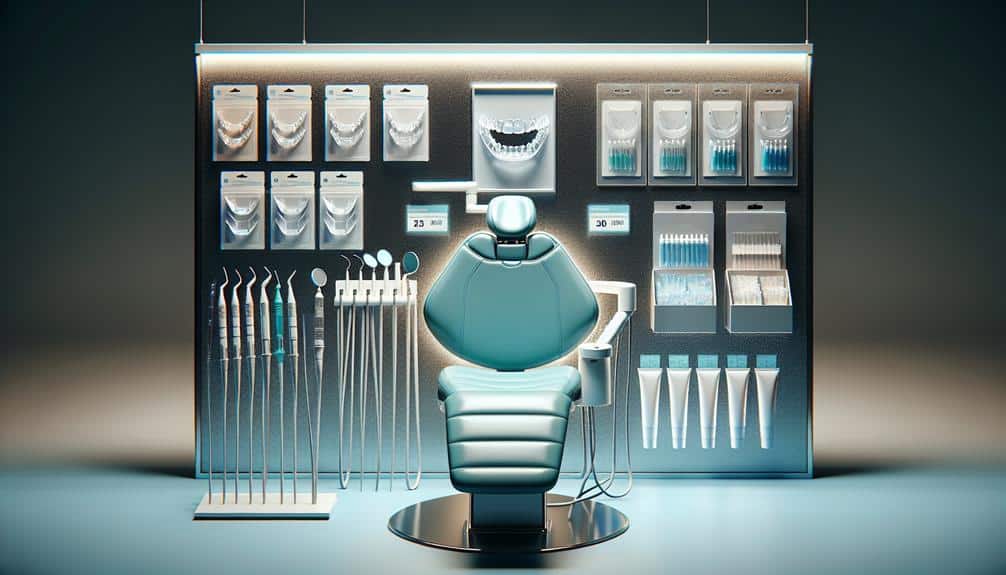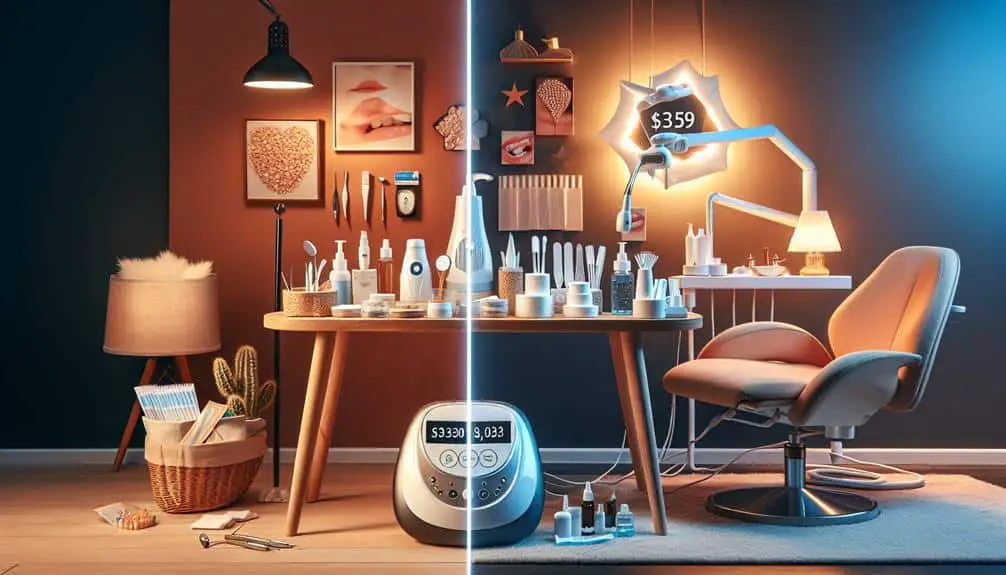When examining teeth whitening costs, important factors to take into account include choosing between professional treatments and at-home kits, treatment duration, the whitening method used, the impact of dental office location, and additional maintenance expenses. The decision between professional and at-home kits affects the speed and visibility of results versus budget-friendliness. Treatment duration varies, with professional treatments typically needing one or two sessions for quicker outcomes compared to multiple sessions for at-home kits. The type of whitening method used also plays a role, with in-office procedures offering stronger and more efficient solutions. Meanwhile, dental office location can influence pricing, with high-cost areas or limited competition potentially leading to higher expenses.
Finally, maintenance costs are essential for long-term effectiveness. Carefully evaluating these factors will help you make informed decisions about the costs and effectiveness of your teeth whitening journey.
Key Points
- Professional treatments use higher concentrations of whitening agents for more effective results.
- Treatment duration varies; professional sessions are quicker than at-home kits.
- Geographic location impacts pricing; higher cost of living areas may charge more.
- Post-treatment maintenance costs include special oral care products for long-lasting results.
- In-office procedures offer potent and efficient whitening solutions despite higher upfront costs.
Professional Vs. At-Home Whitening Kits
When contemplating teeth whitening options, comparing professional treatments with at-home whitening kits provides insight into cost-effectiveness and efficiency. The cost comparison between professional whitening and at-home kits is a significant factor to ponder when aiming for a brighter smile. Professional treatments usually cost more upfront but may provide quicker and more noticeable results compared to at-home kits. On the other hand, at-home whitening kits are generally more budget-friendly but might require more time to achieve desired outcomes.
The effectiveness debate between professional treatments and at-home whitening kits is an ongoing discussion in the dental community. Professional treatments, often performed by dentists, tend to use higher concentrations of whitening agents, which can lead to faster and more dramatic results. However, at-home kits can also be effective, especially for individuals with mild to moderate teeth staining. Understanding the cost implications and effectiveness of each option can help you make an informed decision based on your needs and budget.
Treatment Duration and Sessions
Taking into account the treatment duration and number of sessions is vital in determining the effectiveness and convenience of your chosen teeth whitening method. The duration of a teeth whitening treatment can vary depending on the method used and the initial shade of your teeth. Professional treatments often yield quicker results compared to at-home kits due to the higher concentration of whitening agents used by professionals. Generally, professional treatments may require one or two sessions at the dentist's office, while at-home kits may need multiple sessions over a few weeks to achieve desired whitening results.
It's essential to weigh the impact of treatment duration on your oral health. Prolonged or frequent whitening sessions can sometimes lead to tooth sensitivity or irritation of the gums. It's advisable to follow the instructions provided by your dentist or the product manufacturer to prevent any adverse effects on your oral health. Prioritizing both the effectiveness of the treatment and the maintenance of good oral health ensures a successful teeth whitening experience.
Type of Whitening Method Used
The effectiveness of teeth whitening treatments greatly depends on the type of whitening method utilized. When considering the cost of teeth whitening, one important factor is whether you opt for an in-office procedure or a do-it-yourself (DIY) method. In-office whitening, performed by dental professionals, often involves stronger bleaching agents and advanced technology, yielding quicker and more noticeable results compared to DIY kits.
In-office whitening procedures are typically more expensive upfront due to the professional supervision and quality of materials used. However, they tend to deliver more significant whitening outcomes in a shorter time frame, making them a preferred choice for individuals seeking immediate and efficient results. On the other hand, DIY whitening kits are more budget-friendly but may require multiple applications over an extended period to achieve comparable results to in-office treatments.
When comparing the effectiveness of in-office whitening versus DIY methods, it's evident that in-office procedures offer a more potent and efficient solution for quickly achieving a whiter smile.
Dental Office Location Impact
The placement of a dental office can greatly influence the total cost of teeth whitening treatments. Geographic pricing plays a significant role in determining how much you might pay for teeth whitening services. In areas where the cost of living is higher, dental offices may charge more to cover their expenses. Conversely, in regions with a lower cost of living, teeth whitening treatments may be more affordable.
Local competition also impacts pricing. Dental offices in competitive markets often endeavor to offer competitive pricing to attract clients. This can work in your favor by giving you more options to choose from at different price points. Additionally, areas with fewer dental offices may have higher prices due to limited options.
When considering teeth whitening costs, it's crucial to factor in the geographic location of dental offices and the level of competition in that area to make an informed decision that aligns with your budget and preferences.
Additional Maintenance Costs
Considering the impact of dental office location on teeth whitening costs, it's important to also address the potential additional maintenance costs associated with post-treatment care. After undergoing a teeth whitening procedure, maintaining the long-term results largely depends on your hygiene practices. Proper oral hygiene is vital not only for the longevity of the whitening effects but also for overall dental health.
To guarantee that your investment in teeth whitening pays off over time, you may need to budget for additional maintenance costs such as special toothpaste, mouthwash, or touch-up treatments recommended by your dentist. These expenses are essential for preserving the brightness of your smile and preventing new stains from developing. Neglecting proper maintenance can lead to a quicker fading of the whitening effects, necessitating more frequent and potentially costly touch-up procedures.
Frequently Asked Questions
Are There Any Potential Risks or Side Effects Associated With Teeth Whitening Treatments That I Should Be Aware Of?
When considering teeth whitening, be aware of potential risks and side effects, such as tooth sensitivity or gum irritation. Long term effects are minimal, but precautionary measures like consulting a dentist can mitigate any concerns.
How Can I Maintain My Newly Whitened Teeth to Ensure They Stay White for Longer?
To maintain your newly whitened teeth, prioritize oral hygiene. Brush with a whitening toothpaste, floss daily, and rinse with mouthwash. Avoid staining foods and drinks. Schedule regular dental cleanings. Consider touch-up whitening treatments per your dentist's recommendations for long-lasting results.
Can Certain Lifestyle Factors, Such as Smoking or Drinking Coffee, Impact the Effectiveness of Teeth Whitening Treatments?
Smoking and coffee can hinder the effectiveness of teeth whitening treatments. These lifestyle factors impact how well the whitening procedure works, potentially leading to subpar results. Consider cutting back on these habits for best whitening outcomes.
Are There Any Specific Dietary Restrictions or Recommendations to Follow Before or After Undergoing a Teeth Whitening Treatment?
Wondering about dietary dos and don'ts for teeth whitening? Before treatment, limit staining culprits like coffee. After, opt for white-teeth-friendly foods and avoid pigmented items. Stick to these guidelines for a brighter smile!
How Do I Know if I Am a Suitable Candidate for Teeth Whitening, and Are There Any Factors That May Affect the Results of the Treatment?
To determine if you're a good candidate for teeth whitening, consider factors like existing dental work and sensitivity issues. Success often hinges on your teeth's current shade and the cause of discoloration. Results vary due to individual factors and treatment methods.



